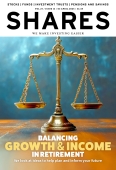Archived article
Please note that tax, investment, pension and ISA rules can change and the information and any views contained in this article may now be inaccurate.
How much extra you’re paying HMRC thanks to frozen income tax bands

The chancellor’s Spring Statement has thrown a spotlight on a growing problem for workers: higher taxes.
According to new figures from the Office for Budget Responsibility (OBR), we’re looking at the highest tax take relative to the economy since World War II.
The Government’s own numbers show that in just the next year, the nation’s income tax bills are set to climb nearly 11%.
In real terms, this means that in 2024/25, the nation will be shelling out a massive £260.3 billion in income tax, but it doesn’t stop there.
By 2027/28, we’re looking at a staggering £310 billion in income tax, with the OBR predicting that tax as a share of the economy will hit 37.7%.
WHY ARE TAX BILLS RISING?
The main reason behind this rise is the government’s decision to freeze income tax thresholds.
This freeze, brought in under the Conservatives, combined with rising wages is pushing more people into higher tax bands.
Basically, as people earn more, they’re getting taxed more because their income is moving into higher brackets.
It’s like a stealth tax hike that isn’t technically an increase in the rate itself, but it’s still hitting people’s pockets.
If income tax bands had kept up with inflation, people would be paying less in tax because more of their income would have been shielded by the tax-free allowance.
THE BIG FREEZE AND ITS IMPACT
The freeze on tax bands is having a real impact on people’s wallets.
For example, the personal allowance, the amount you can earn before you start paying tax, would have been £16,385 by the end of the freeze in 2027/28 if it had kept pace with inflation.
Instead, it’s stuck at £12,570. That’s nearly £4,000 less that’s being protected from tax.
As for the higher-rate threshold, it would have been over £65,500 by 2027/28 if it had risen with inflation.
Instead, it’s staying at £50,270, which means more people earning just a bit more will find themselves paying higher taxes on a larger chunk of their income.
WAGE GROWTH AND MORE TAXES
The OBR has also raised its forecast for wage growth, which sounds like good news for workers if bigger paychecks are coming.
But there’s a catch – when wages go up, so does the tax bill, because more of that extra income gets taxed at higher rates.
The OBR now expects the Treasury to rake in an extra £49 billion in income tax and national insurance receipts across the period to the end of the current parliament thanks to wage increases.
THE POLITICAL TWIST
Here’s where things get tricky. Labour promised not to raise income tax rates in their manifesto, and technically, they haven’t.
However, by continuing the freeze on tax bands, they’ve effectively increased the amount people are paying in tax without officially raising the rate.
It’s a bit of a loophole, and it means workers will still see their tax bills go up even though there’s been no official rate hike.
For example, someone who is a basic-rate taxpayer will pay almost £3,000 more in tax over the period of the freeze, assuming average wage increases.
That’s because without the freeze, their tax-free allowance would have shielded more of their earnings from tax, but with the freeze, more of their pay gets hit with a 20% tax rate.
For people earning £50,000 or more, the impact is even worse. Wage growth pushes their income into the higher 40% tax band, meaning they’ll pay almost £15,000 more in tax over the course of the freeze. It’s a hefty price to pay for a pay rise.
A FAINT GLIMMER OF HOPE
Looking ahead, there’s some relief in sight, kind of. Government forecasts suggest the overall tax bill will keep climbing and hit £322 billion by 2029/30.
However, once the freeze on income tax bands ends, the tax burden as a share of the economy is expected to drop slightly since people will be able to earn more before getting taxed at higher rates.
But, even when the freeze ends, the damage has already been done. The years of frozen tax bands mean workers have been paying more tax than they would have otherwise, and that’s something that won’t be easily undone.
Important information:
These articles are provided by Shares magazine which is published by AJ Bell Media, a part of AJ Bell. Shares is not written by AJ Bell.
Shares is provided for your general information and use and is not a personal recommendation to invest. It is not intended to be relied upon by you in making or not making any investment decisions. The investments referred to in these articles will not be suitable for all investors. If in doubt please seek appropriate independent financial advice.
Investors acting on the information in these articles do so at their own risk and AJ Bell Media and its staff do not accept liability for losses suffered by investors as a result of their investment decisions.
Issue contents
Editor's View
Feature
Great Ideas
Investment Trusts
News
- Shares in Naked Wines pop to year-high on plan to unlock value
- Aston Martin Lagonda shares skid to new low on US tariffs
- Interest in European infrastructure and renewables continues to build
- S&P 500 endures worst quarter since 2022 on stagflation fears
- Why WH Smith was prepared to sell its High Street stores at bargain basement price
 magazine
magazine








